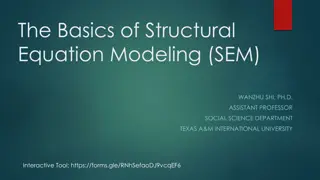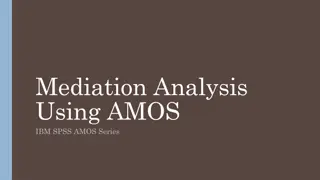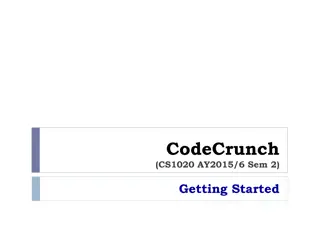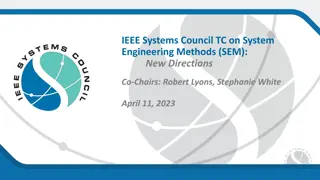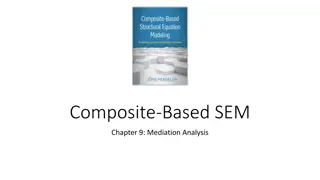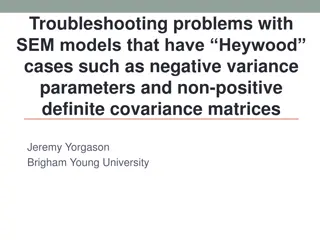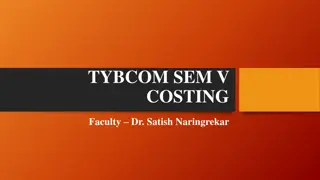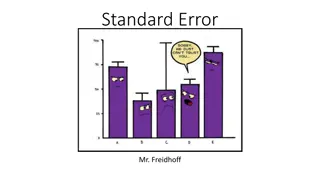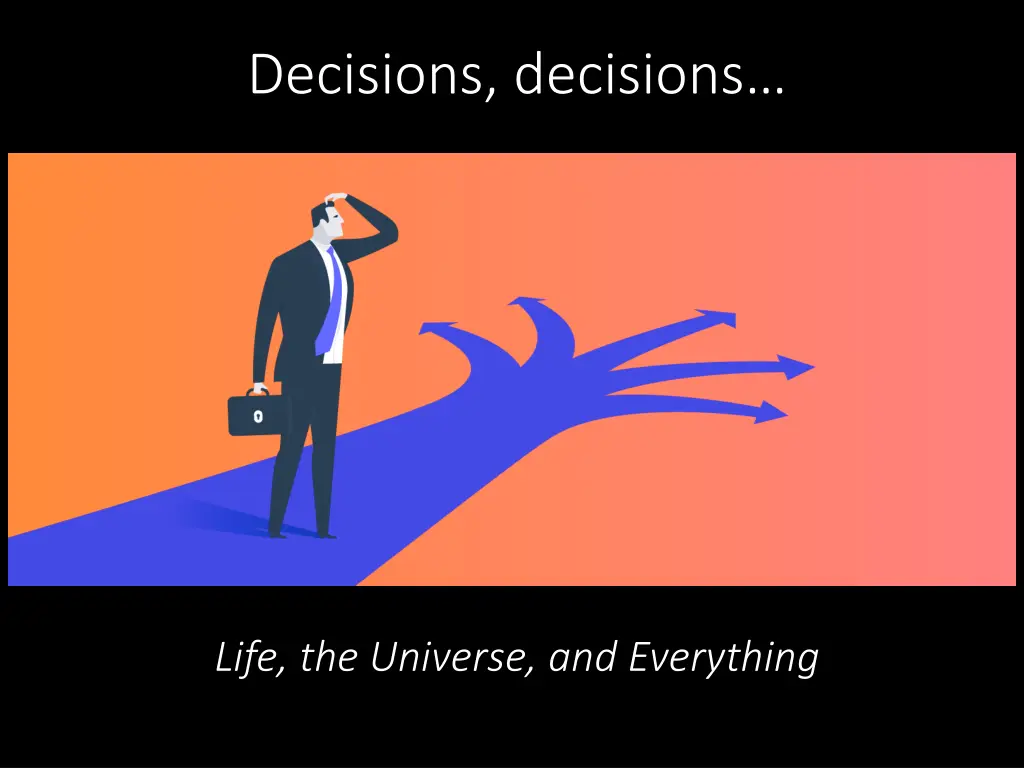
Understanding Paradoxes in Life
Explore the concept of paradoxes, where apparently acceptable reasoning leads to seemingly unacceptable conclusions. Dive into paradoxes in math, science, and philosophy, where challenging beliefs can lead to solving these intriguing puzzles.
Download Presentation

Please find below an Image/Link to download the presentation.
The content on the website is provided AS IS for your information and personal use only. It may not be sold, licensed, or shared on other websites without obtaining consent from the author. If you encounter any issues during the download, it is possible that the publisher has removed the file from their server.
You are allowed to download the files provided on this website for personal or commercial use, subject to the condition that they are used lawfully. All files are the property of their respective owners.
The content on the website is provided AS IS for your information and personal use only. It may not be sold, licensed, or shared on other websites without obtaining consent from the author.
E N D
Presentation Transcript
Decisions, decisions Life, the Universe, and Everything
Todays Plan I. Paradoxes II. Newcomb s Paradox A. One-box solutions: expected utility B. Two-box solutions: dominance III. Conclusions
PARADOXES PARADOXES
What is a paradox? A paradox is an apparently unacceptable conclusion derived by apparently acceptable reasoning from apparently acceptable premises. R.M. Sainsbury, Paradoxes Cambridge University Press, 2009 Today, we consider some paradoxes that don t have any universally agreed-upon solutions (yet).
What is a paradox? A paradox is an apparently unacceptable conclusion derived by apparently acceptable reasoning from apparently acceptable premises. R.M. Sainsbury, Paradoxes Cambridge University Press, 2009 Today, we consider some paradoxes that don t have any universally agreed-upon solutions (yet).
Seemingly Valid Argument 1. Seemingly acceptable premise. 2. Seemingly acceptable premise. 3. Seemingly unacceptable conclusion.
Seemingly Valid Argument 1. Seemingly acceptable premise. 2. Seemingly acceptable premise. 3. Seemingly unacceptable conclusion. Paradoxes play an important role in math, science, and philosophy. To solve a paradox, you have to give up a belief that seems obviously true when you first think about it. Often, this is a belief that logicians, mathematicians, scientists, or philosophers have been taking for granted for a long time.
Seemingly Valid Argument Option #1: reject at least one seemingly acceptable premise. 1. Seemingly acceptable premise. 2. Seemingly acceptable premise. 3. Seemingly unacceptable conclusion. Paradoxes play an important role in math, science, and philosophy. To solve a paradox, you have to give up a belief that seems obviously true when you first think about it. Often, this is a belief that logicians, mathematicians, scientists, or philosophers have been taking for granted for a long time.
Seemingly Valid Argument Option #1: reject at least one seemingly acceptable premise. 1. Seemingly acceptable premise. 2. Seemingly acceptable premise. Option #2: accept a seemingly unacceptable conclusion. 3. Seemingly unacceptable conclusion. Paradoxes play an important role in math, science, and philosophy. To solve a paradox, you have to give up a belief that seems obviously true when you first think about it. Often, this is a belief that logicians, mathematicians, scientists, or philosophers have been taking for granted for a long time.
Seemingly Valid Argument Option #1: reject at least one seemingly acceptable premise. 1. Seemingly acceptable premise. 2. Seemingly acceptable premise. Option #2: accept a seemingly unacceptable conclusion. 3. Seemingly unacceptable conclusion. Option #3: find fault with apparently acceptable reasoning. Paradoxes play an important role in math, science, and philosophy. To solve a paradox, you have to give up a belief that seems obviously true when you first think about it. Often, this is a belief that logicians, mathematicians, scientists, or philosophers have been taking for granted for a long time.
Some Historically Important Paradoxes Russell s Paradox (mathematics) Zeno s Paradoxes (physics) Sorites Paradox (logic) Liar Paradox (language)
Some Historically Important Paradoxes Russell s Paradox (mathematics) Zeno s Paradoxes (physics) Sorites Paradox (logic) Is the set of all sets that aren t members of themselves a member of itself? Liar Paradox (language)
Some Historically Important Paradoxes Russell s Paradox (mathematics) Zeno s Paradoxes (physics) Sorites Paradox (logic) Liar Paradox (language)
Some Historically Important Paradoxes Russell s Paradox (mathematics) Zeno s Paradoxes (physics) Sorites Paradox (logic) Liar Paradox (language)
Some Historically Important Paradoxes Russell s Paradox (mathematics) Zeno s Paradoxes (physics) Sorites Paradox (logic) Liar Paradox (language)
Some Historically Important Paradoxes Russell s Paradox (mathematics) Zeno s Paradoxes (physics) Sorites Paradox (logic) Liar Paradox (language) If something is a heap of sand, it remains a heap if you remove one grain of sand from it.
Some Historically Important Paradoxes Russell s Paradox (mathematics) Zeno s Paradoxes (physics) Sorites Paradox (logic) Liar Paradox (language)
Some Historically Important Paradoxes Russell s Paradox (mathematics) This sentence is false. Zeno s Paradoxes (physics) Sorites Paradox (logic) Liar Paradox (language)
Some Historically Important Paradoxes Russell s Paradox (mathematics) This sentence is false. Zeno s Paradoxes (physics) Is this true? Then it s false. Is it false? Then it s true. Sorites Paradox (logic) Liar Paradox (language)
Some Historically Important Paradoxes Russell s Paradox (mathematics) This sentence is false. Zeno s Paradoxes (physics) Is this true? Then it s false. Is it false? Then it s true. Sorites Paradox (logic) Liar Paradox (language)
Some Historically Important Paradoxes Russell s Paradox (mathematics) This sentence is false. Zeno s Paradoxes (physics) Is this true? Then it s false. Is it false? Then it s true. Sorites Paradox (logic) Liar Paradox (language)
NEWCOMBS PARADOX NEWCOMB S PARADOX
Box A Box A $1,000 $1,000 Box B Box B or $1,000,000 $1,000,000 $0 $0 or
One year ago, the Predictor made a prediction. If he predicted that you would take Box B only, he put $1,000,000 into Box B. If he predicted you would take both boxes, he left Box B empty. Nobody has touched the boxes since then. The Predictor has made many predictions like this, and he has been correct 90% of the time. Box A Box A $1,000 $1,000 Box B Box B or $1,000,000 $1,000,000 $0 $0 or
Should you take both boxes, or just Box B? Box A Box A $1,000 $1,000 Box B Box B or $1,000,000 $1,000,000 $0 $0 or
Take just one box? Take just one box?
On a roll of 1, 2, or 3, you pay me $1. On a roll of 4, 5, or 6, I pay you $2.
On a roll of 1, 2, or 3, you pay me $1. On a roll of 4, 5, or 6, I pay you $2.
Expected Utility Reasoning 1, 2, or 3 gets rolled. 4, 5, or 6 gets rolled. Likelihood: 50% Likelihood: 50% Take bet. -$1.00 +$2.00 Don t take bet. $0 $0 On a roll of 1, 2, or 3, you pay me $1. On a roll of 4, 5, or 6, I pay you $2.
Expected Utility Reasoning 1, 2, or 3 gets rolled. 4, 5, or 6 gets rolled. Likelihood: 50% Likelihood: 50% Take bet. -$1.00 +$2.00 Don t take bet. $0 $0 On a roll of 1, 2, or 3, you pay me $1. On a roll of 4, 5, or 6, I pay you $2.
Expected Utility Reasoning 1, 2, or 3 gets rolled. 4, 5, or 6 gets rolled. Likelihood: 50% Likelihood: 50% Take bet. -$1.00 +$2.00 Your options Don t take bet. $0 $0 On a roll of 1, 2, or 3, you pay me $1. On a roll of 4, 5, or 6, I pay you $2.
Expected Utility Reasoning 1, 2, or 3 gets rolled. 4, 5, or 6 gets rolled. Likelihood: 50% Likelihood: 50% Take bet. -$1.00 +$2.00 Don t take bet. $0 $0 On a roll of 1, 2, or 3, you pay me $1. On a roll of 4, 5, or 6, I pay you $2.
Expected Utility Reasoning 1, 2, or 3 gets rolled. 4, 5, or 6 gets rolled. Likelihood: 50% Likelihood: 50% Take bet. -$1.00 +$2.00 Don t take bet. $0 $0 On a roll of 1, 2, or 3, you pay me $1. On a roll of 4, 5, or 6, I pay you $2.
Expected Utility Reasoning 1, 2, or 3 gets rolled. 4, 5, or 6 gets rolled. Likelihood: 50% Likelihood: 50% Take bet. -$1.00 +$2.00 Possibilities that are relevant to your decision Don t take bet. $0 $0 On a roll of 1, 2, or 3, you pay me $1. On a roll of 4, 5, or 6, I pay you $2.
Expected Utility Reasoning 1, 2, or 3 gets rolled. 4, 5, or 6 gets rolled. Likelihood: 50% Likelihood: 50% Take bet. -$1.00 +$2.00 Don t take bet. $0 $0 On a roll of 1, 2, or 3, you pay me $1. On a roll of 4, 5, or 6, I pay you $2.
Expected Utility Reasoning 1, 2, or 3 gets rolled. 4, 5, or 6 gets rolled. Likelihood: 50% Likelihood: 50% What happens if you bet and I roll 1, 2 or 3? Take bet. +$2.00 Don t take bet. $0 $0 On a roll of 1, 2, or 3, you pay me $1. On a roll of 4, 5, or 6, I pay you $2.
Expected Utility Reasoning 1, 2, or 3 gets rolled. 4, 5, or 6 gets rolled. Likelihood: 50% Likelihood: 50% Take bet. -$1 +$2.00 Don t take bet. On a roll of 1, 2, or 3, you pay me $1. On a roll of 4, 5, or 6, I pay you $2.
Expected Utility Reasoning 1, 2, or 3 gets rolled. 4, 5, or 6 gets rolled. Likelihood: 50% Likelihood: 50% What happens if you bet and I roll 4, 5 or 6? Take bet. -$1 Don t take bet. On a roll of 1, 2, or 3, you pay me $1. On a roll of 4, 5, or 6, I pay you $2.
Expected Utility Reasoning 1, 2, or 3 gets rolled. 4, 5, or 6 gets rolled. Likelihood: 50% Likelihood: 50% Take bet. -$1 +$2 Don t take bet. On a roll of 1, 2, or 3, you pay me $1. On a roll of 4, 5, or 6, I pay you $2.
Expected Utility Reasoning 1, 2, or 3 gets rolled. 4, 5, or 6 gets rolled. Likelihood: 50% Likelihood: 50% Take bet. -$1 +$2 What if you don t bet and I roll 1, 2 or 3? Don t take bet. On a roll of 1, 2, or 3, you pay me $1. On a roll of 4, 5, or 6, I pay you $2.
Expected Utility Reasoning 1, 2, or 3 gets rolled. 4, 5, or 6 gets rolled. Likelihood: 50% Likelihood: 50% Take bet. -$1 +$2 Don t take bet. $0 On a roll of 1, 2, or 3, you pay me $1. On a roll of 4, 5, or 6, I pay you $2.
Expected Utility Reasoning 1, 2, or 3 gets rolled. 4, 5, or 6 gets rolled. Likelihood: 50% Likelihood: 50% Take bet. -$1 +$2 What if you don t bet and I roll 4, 5 or 6? Don t take bet. $0 On a roll of 1, 2, or 3, you pay me $1. On a roll of 4, 5, or 6, I pay you $2.
Expected Utility Reasoning 1, 2, or 3 gets rolled. 4, 5, or 6 gets rolled. Likelihood: 50% Likelihood: 50% Take bet. -$1 +$2 Don t take bet. $0 $0 On a roll of 1, 2, or 3, you pay me $1. On a roll of 4, 5, or 6, I pay you $2.
Expected Utility Reasoning 1, 2, or 3 gets rolled. 4, 5, or 6 gets rolled. Likelihood: 50% Likelihood: 50% Take bet. -$1 +$2 Don t take bet. $0 $0 On a roll of 1, 2, or 3, you pay me $1. On a roll of 4, 5, or 6, I pay you $2.
Expected Utility Reasoning 1, 2, or 3 gets rolled. 4, 5, or 6 gets rolled. Likelihood: 50% Likelihood: 50% Take bet. -$1 +$2 Don t take bet. $0 $0 On a roll of 1, 2, or 3, you pay me $1. On a roll of 4, 5, or 6, I pay you $2.
Expected Utility Reasoning 1, 2, or 3 gets rolled. 4, 5, or 6 gets rolled. Likelihood: 50% Likelihood: 50% Take bet. -$0.50 +$2 Don t take bet. $0 $0 On a roll of 1, 2, or 3, you pay me $1. On a roll of 4, 5, or 6, I pay you $2.
Expected Utility Reasoning 1, 2, or 3 gets rolled. 4, 5, or 6 gets rolled. Likelihood: 50% Likelihood: 50% Take bet. -$0.50 +$2 Don t take bet. $0 $0 risk-adjusted loss
Expected Utility Reasoning 1, 2, or 3 gets rolled. 4, 5, or 6 gets rolled. Likelihood: 50% Likelihood: 50% Take bet. -$0.50 +$2 Don t take bet. $0 $0 risk-adjusted loss
Expected Utility Reasoning 1, 2, or 3 gets rolled. 4, 5, or 6 gets rolled. Likelihood: 50% Likelihood: 50% Take bet. -$0.50 +$1 Don t take bet. $0 $0 risk-adjusted loss
Expected Utility Reasoning 1, 2, or 3 gets rolled. 4, 5, or 6 gets rolled. Likelihood: 50% Likelihood: 50% Take bet. -$0.50 +$1 Don t take bet. $0 $0 risk-adjusted loss risk-adjusted gain



